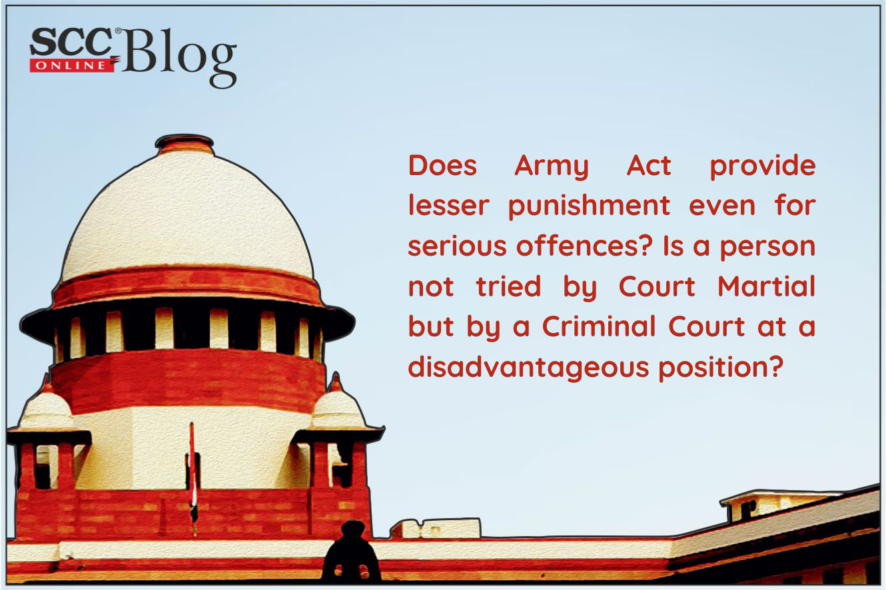Supreme Court: In a case where it was argued before the bench of Dr. DY Chandrachud* and Surya Kant, JJ that in case the trial is conducted by the ordinary criminal court and not a court-martial under the Army Act, the accused would not be able to avail the benefit of being awarded a lower punishment under the Army Act, 1950, the Court has held,
“If that was the intent of the legislature – that is to protect persons subject to the Army Act by awarding them lesser punishment even for serious offences – then the Act would not have provided for concurrent jurisdiction of court-martial and ordinary criminal courts at all. Although the Army Act is special law compared to the IPC, if the statute in its text does not make any qualifications or exceptions to the general law, it would be impermissible for the court to read such qualifications in the Act.”
Section 69 of the Army Act
Subject to the provisions of section 70, any person subject to this Act who at any place in or beyond India, commits any civil offence, shall be deemed to be guilty of an offence against this Act and, if charged therewith under this section, shall be 39 liable to be tried by a court-martial and, on conviction, be punishable as follows, that is to say,
(a) if the offence is one which would be punishable under any law in force in India with death or with transportation, he shall be liable to suffer any punishment, other than whipping, assigned for the offence, by the aforesaid law and such less punishment as is in this Act mentioned; and
(b) in any other case, he shall be liable to suffer any punishment, other than whipping, assigned for the offence by the law in force in India, or imprisonment for a term which may extend to seven years, or such less punishment as is in this Act mentioned.
Jurisdiction of Criminal Court versus Court Martial
Section 69 does not ipso jure oust the jurisdiction of the ordinary criminal court. Where there exists concurrent jurisdiction in the court-martial and in the ordinary criminal court, primarily the discretion of conducting the court-martial in preference to a trial by the ordinary criminal court is entrusted to the designated officer under Section 125. The designated officer has been conferred with the discretion “to decide before which court the proceedings shall be instituted”. Moreover, Section 125 has a conjunctive requirement which is amplified by the expression “and, if that officer decides that they should be instituted before a court-martial”. Thus, the conjunctive requirement under Section 125 is that the competent officer has the discretion to decide before which court the proceedings shall be instituted and if the officer exercises that discretion to institute proceedings before a court-martial, then the officer will direct that the accused be detained in military custody. Section 125, in other words, not only recognizes that an element of discretion has been vested in the designated officer, but it also postulates that the designated officer should have decided that the proceedings be instituted by the court-martial in which event the court-martial would take place.
Is a person tried and convicted by a Court Martial at an advantageous position than a person tried and convicted by a Criminal Court owing to the lower punishment under the Army Act?
Sub-section (a) of Section 69 states if a person is convicted of a ‘civil offence’ which is punishable with death or transportation under the law in force, then he shall be liable to suffer any punishment, other than whipping, assigned for the offence by the aforesaid law and such less punishment as is in this Act mentioned. In contrast with sub-Section (a), sub-Section (b) provides that in all other offences, the person convicted shall be liable to suffer the punishment assigned under the laws in force or imprisonment for a term which may extend to seven years, or such less punishment as provided in the Act.
The words of the statute clearly indicate that the legislature provided different punishments for serious offences which under law are punishable with death or life imprisonment, and for all other offences. In case of the former, sub-Section (a) of Section 69 provides that the court-martial may convict him and punish him with death or life imprisonment. In addition to this, the court-martial may also give a lesser punishment under the Army Act (such as cashiering, dismissal from service, etc., provided under Section 71). The use of the word “and” in sub-Section (a) clarifies the intent of the legislature, which is to ensure that the Army authorities have sufficient discretion to grant a punishment for serious offences, over and beyond what is permissible under Penal Code. This however, does not imply that a person who is otherwise liable for death or life imprisonment can be granted a lesser punishment under the Army Act.
In contrast, sub-Section (b) of Section 69 uses the term “or” to indicate that for offences that under the Penal Code or any other law are of less severity, the Army authorities may order a lesser punishment.
If the argument that in case the trial is conducted by the ordinary criminal court and not a court-martial under the Army Act, the accused would not be able to avail the benefit of being awarded a lower punishment under the Army Act, is accepted, it would imply that a person who is convicted and punished by a Court-martial under the Army Act will be in an advantageous position than a person who, though subject to the Army Act, has been convicted by an ordinary criminal court.
[State of Sikkim v. Jasbir Singh, 2022 SCC OnLine SC 128, decided on 01.02.2022[
*Judgment by: Justice Dr. DY Chandrachud
Counsels
For State: Vivek Kohli, Advocate General and Aman Lekhi, Additional Solicitor General
For Accused: Senior Advocate Pradeep Kumar Dey






